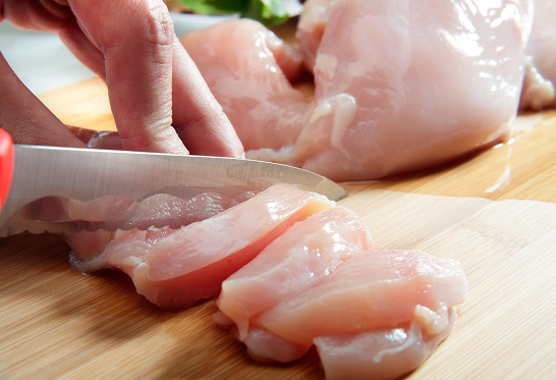E. coli
An E. coli infection can be much more serious than regular food poisoning. UC Davis Health is at the forefront of E. coli research and care.
Medically reviewed by Dean Blumberg, M.D. on Nov. 08, 2023.

What Is E. coli Infection?
Escherichia coli (E. coli) is bacteria that live in your intestines and helps with food digestion. These bacteria can also live in the intestines of some animals. Most types of E. coli are harmless, but some types can cause intestinal illness.
Intestinal illness most commonly occurs due to a type of E. coli that makes a toxin (Shiga). Shiga toxin damages your small intestine lining.
At the Division of Infectious Diseases, we offer the latest care for E. coli infection. We use the most up-to-date research and tools to prevent, diagnose and treat this infectious disease.
Symptoms of E. coli Infection
E. coli symptoms usually start 3 to 4 days after eating or drinking a substance containing the bacteria. But symptoms can also begin from 1 to 10 days after you’re exposed.
Common Symptoms
If you have an E. coli infection, you may experience:
- Abdominal cramps
- Diarrhea, which is often bloody
- Fatigue
- Fever of usually less than 101°F
- Nausea and vomiting
Emergency Symptoms
About 5-10% of people with an E. coli infection develop a life-threatening condition called hemolytic uremic syndrome (HUS). HUS symptoms show up about 7 days after your first symptoms and may include:
- Decreased urination
- Extreme fatigue
- Kidney failure
- Increased heart rate
- Loss of pink cheek color
- Lightheadedness and confusion
- Seizures
Causes of E. coli Infection
You can become infected with E. coli by eating or drinking contaminated food or liquids, or from contact with other infected people or animals. The most common causes of E. coli infection include:
Contaminated Food
Eating contaminated food is the most common way to get an E. coli infection. Foods that may contain E. coli include ground beef (especially undercooked meat); unpasteurized milk or juices; vegetables, fruit and cheeses made from raw milk.
Contaminated Water
Swallowing water contaminated with E. coli from animals or humans can cause an infection. You may find contaminated water in lakes, rivers, streams, wells and local water supplies.
Contact With Others
You can pass along E. coli bacteria on your hands if you touch feces after having a bowel movement, change a diaper or touch the hands of someone who is infected. You may also become infected at a petting zoo or from farm animals.
E. coli Risk Factors
The chances of getting an E. coli infection or more complications may be higher if you have one or more of these risk factors:
Age
Children under 5 and adults over 65 are at greater risk of illness and complications from an E. coli infection.
Consuming Specific Foods
Eating undercooked meats, unpasteurized milk or juice or raw milk cheeses can increase your risk.
Lower Stomach Acid
Taking a medication to decrease stomach acid may raise your risk of an E. coli infection.
Weaker Immune System
Having a weaker immune system, from conditions such as diabetes, HIV/AIDS, urinary tract infections (UTIs), chemotherapy or medications after organ transplants, may increase E. coli infection risk.
Diagnosing an E. coli Infection
To diagnose an E. coli infection, we send a sample of your stool (poop) to a lab. They can test the sample for E. coli bacteria.
E. coli Treatments at UC Davis Health
Most E. coli infections go away on their own in about 5 to 7 days. We recommend drinking plenty of fluids and resting to help you feel better. If you have hemolytic uremic syndrome (HUS), we may treat you in the hospital with procedures such as:
Blood Transfusions
Transfusion of platelets can help your blood clot and red blood cells can help reduce anemia symptoms related to HUS.
Intravenous Fluids
You may get intravenous (IV) fluids through a vein to help replace lost fluids.
Kidney Dialysis
We may use kidney dialysis to remove waste and excess fluid from your blood if your kidneys stop working properly.
Medications
We suggest medications to lower your blood pressure if HUS causes kidney damage.
Preventing E. coli Infection
There are certain steps you can take to reduce your risk of an E. coli infection:
Avoid Unpasteurized Products
Not drinking unpasteurized milk or juice can help prevent E. coli infection.
Don’t Swallow Water From Outdoor Sources
Avoid swallowing water in lakes, ponds, streams and swimming pools.
Cook Meats Thoroughly
Cook beef steaks and roasts to at least 145°F and ground beef and pork to at least 160°F.
Prevent Cross-Contamination
Wash cutting boards, counters and utensils before and after they contact raw meat.
Rinse Fruits and Vegetables
Always rinse fruits and vegetables thoroughly to get rid of any bacteria.
Wash Your Hands
Wash your hands before or after eating food, using the bathroom, changing a diaper and coming into contact with animals.
“E. coli (Escherichia coli) – Prevention,” Centers for Disease Control and Prevention (CDC), https://www.cdc.gov/ecoli/ecoli-prevention.html
Hemolytic uremic syndrome (HUS) may affect up to
10%Of people with Shiga toxin-producing E. coli (STEC) infection
Source: World Health Organization: E. coli
Request an Appointment
As Sacramento's No. 1 hospital, you'll benefit from unique advantages in primary care and specialty care. This includes prevention, diagnosis and treatment options from experts in 150 specialties.
Referring Physicians
To refer a patient, submit an electronic referral form or call.
800-4-UCDAVIS
Patients
Call to make an appointment.
Consumer Resource Center
800-2-UCDAVIS

Ranked among the nation’s best hospitals
A U.S. News & World Report best hospital in cardiology, heart & vascular surgery, diabetes & endocrinology, ENT, geriatrics, neurology & neurosurgery, and pulmonology & lung surgery.

Ranked among the nation’s best children’s hospitals
U.S. News & World Report ranked UC Davis Children’s Hospital among the best in pediatric nephrology, orthopedics*, and pulmonology & lung surgery. (*Together with Shriners Children’s Northern California)

Ranked Sacramento’s #1 hospital
Ranked Sacramento’s #1 hospital by U.S. News, and high-performing in aortic valve surgery, back surgery (spinal fusion), COPD, colon cancer surgery, diabetes, gynecological cancer surgery, heart arrhythmia, heart failure, kidney failure, leukemia, lymphoma & myeloma, lung cancer surgery, pacemaker implantation, pneumonia, prostate cancer surgery, stroke, TAVR, cancer, orthopedics, gastroenterology & GI surgery, and urology.

The nation’s highest nursing honor
UC Davis Medical Center has received Magnet® recognition, the nation’s highest honor for nursing excellence.

World-class cancer care
One of ~59 U.S. cancer centers designated “comprehensive” by the National Cancer Institute.

A leader in health care equality
For the 13th consecutive year, UC Davis Medical Center has been recognized as an LGBTQ+ Healthcare Equality Leader by the educational arm of America’s largest civil rights organization.

